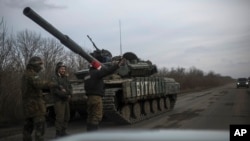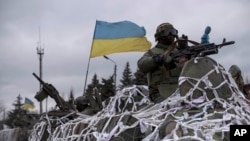The leaders of Russia, Ukraine, Germany and France have agreed to meet Wednesday in Belarus for talks aimed at a deal to end the surging pro-Russian rebellion in eastern Ukraine.
Their agreement came Sunday in four-way phone talks that followed crisis talks Friday in Moscow involving Russian President Vladimir Putin, German Chancellor Angela Merkel and French President Francois Hollande.
Merkel is due in Washington Monday for talks with President Barack Obama about the fighting, which has claimed more than 5,600 lives since rebels launched their uprising 10 months ago. A cease-fire reached in September has gone unheeded by both sides.
There were no public signs on Sunday of movement toward a new deal to end the fighting. However, Ukraine's President Petro Poroshenko voiced optimism that a "swift and unconditional cease-fire" will be reached.
Despite that optimism, Russian President Putin warned in a newspaper interview set for publication in Egypt that Kyiv must end its military operations near the Russian border. He also said Kyiv must end what he called punitive economic measures aimed at disrupting daily life in Russian-speaking eastern Ukraine.
Ukrainian President Petro Poroshenko, citing that progress was reached during a call among the leaders on Sunday, predicted that a "swift and unconditional cease-fire" will be agreed to Wednesday between his government and the pro-Russian separatists it has been battling in eastern Ukraine.
'One of the last chances'
For his part, French President Hollande said the upcoming talks present "one of the last chances" for reaching peace after nearly a year of fighting in eastern Ukraine.
Fighting has continued in eastern Ukraine, with intense battles in recent days. Separatist and Kyiv forces said 12 civilians and 12 Ukrainian forces were killed in the last day.
At a security conference in Munich Sunday, German Foreign Minister Frank-Walter Steinmeier said negotiators on the French-German plan are "far from finding a political solution" to Ukraine's conflict after a few days of "intense" debate.
"For us Europeans, this conflict still means permanent security can only be together with and not against Russia, however this cannot be a unilateral recognition. It has to be clear to Moscow as well that there is only a good future for Russia with Europe, together with Europe, and not against Europe," Steinmeier said.
"It's also Moscow's task to define joint and common interests. We've seen too little here so far and you have also heard and listened to my colleague Lavrov and of course this was not also conducive to our discussion," he added.
However, Steinmeier said negotiators are "far from finding a political solution" to the crisis, after a weekend of "intense" debate.
He added that supplying Ukraine with lethal weapons would be "highly risky" and "counterproductive."
Federica Mogherini, the European Union's foreign policy chief, said in Munich the bloc is trying to find ways to fully implement the Minsk agreement.
"At our east, on European territory, the conflict in Ukraine has carried an unsustainable price in human lives, has shown us that one of the basic principles of international law -- respect of a country's territorial integrity and sovereignty, and that you don't change borders by force -- can be violated. An extremely dangerous precedent, not only for Europe, but for the rest of the world as well," Mogherini said.
Kerry: No rift between US, allies
Also in Munich, U.S. Secretary of State John Kerry addressed reports of a rift between the U.S. and Europe related to supplying Ukraine with weapons. He said there is no split between the U.S. and its European allies, but that all agree Ukraine's challenges will end through diplomacy, not with military force.
"Let me assure everybody, there is no division, there is no split. I keep hearing people trying to create one -- we are united, we are working closely together, we all agree that this challenge will not end through military force, we are united in our diplomacy," Kerry said.
"But the longer that it takes, the more the off-ramps are avoided, the more we will be forced to raise the costs on Russia and its proxies," he said.
"Suffice it to say that today Russia is seeking to fundamentally alter the security landscape of eastern and central Europe, first through its illegal occupation of Crimea, and now through the brazen effort, the overt effort, indisputable effort to destabilize eastern Ukraine," Kerry added.
In an interview to fully air Sunday on NBC's Meet the Press, Kerry said the U.S. would be helping Ukraine with the understanding that there is no military solution.
However, U.S. President Barack Obama has been considering providing lethal weaponry to Kyiv's out-gunned forces, an escalation beyond the economic sanctions the U.S. and Europe have already imposed on Moscow.
The Western powers contend that Moscow has been arming the separatists, although Russia continues to deny it.
French Foreign Minister Laurent Fabius said at the conference that France and its allies must stick together, show resolve and not agree to concessions that undermine European security. But he said no one wants to get "trapped" in a raging war.
Mogherini said the conflict in Ukraine has shown that one of the basic tenets of international law -- respect for a country's territorial integrity -- can be violated. She called this an "extremely dangerous precedent" for the world.
The cease-fire signed in September in Minsk called on forces from both sides to stop the shelling, pull back from the front lines and begin immediate peace talks. The deal was violated almost from the moment it was signed.
Death toll, displaced
Ukrainian forces have been fighting to take back parts of eastern Ukraine seized by Russian-backed separatists when a new Western-leaning government took power in Ukraine last year.
The United Nations said more than 5,300 people have been killed in the conflict in Ukraine, which began nearly a year ago.
Last Friday, the United Nations High Commissioner for Refugees reported that nearly 1 million civilians have been internally displaced by fighting in eastern Ukraine.
Russia has denied involvement in the fighting. But Poroshenko stood before reporters at the security conference in Munich Saturday holding up Russian passports that he said were taken from Russian soldiers inside Ukraine.
Pam Dockins contributed to this report from Munich.






